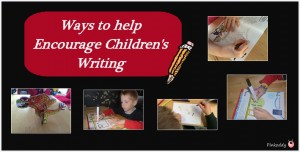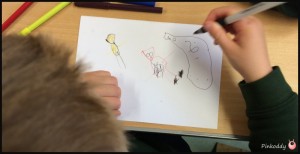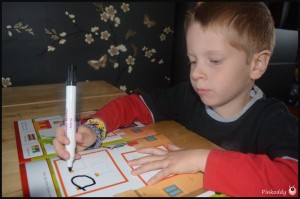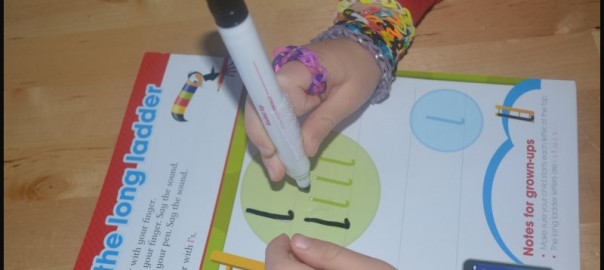Writing is an area of development that The Sensory Seeker has struggled with. He hasn’t got very good fine motor skills and so finds it hard to hold the pencil. If you think that learning to write is easy, then try putting your pen in the hand that you do not normally write with, then close your eyes and write your address. Was it as easy as you thought? There is so much to think about – not just the shapes of the letters, how to space them out, whether you have room on the paper, which directions to go from – plus any other distractions going on around you.
The Development of Children’s Writing Skills
When you start to write you do not need to worry about things like having ideas and imagination, talking about feeling or having a good memory – that will all come later. First you need to focus on holding the pencil, hand-eye co-ordination, time to experiment and being allowed to draw and scribble.

The writing journey
Writing goes through a journey, starting with mark making. I tend to not call it scribble as it is the first important step to writing. This then develops to tell a story. It may not look like it makes sense but it does to the child. Then comes the identifiable shapes and patterns – lines, squiggles and blobs. As control improves the shapes and letters become clearer. They learn the rules that writing goes from left to right, top to bottom. They leave gaps to show where the words start and finish. More letters will be used to tell the story. They start to spell. They begin to use their phonic knowledge. The write simple sentences. They learn about punctuation. They will write stories making sense phonetically, and they will learn about using the right word. Help to encourage extending their vocabulary. Spelling correctly comes later.
Encourage your child’s Writing

- Make a postcard.
- Let them make a shopping list, or write a recipe.
- Give them lots of stationery – fun notepads, stickers, post-it notes, fun pencils and rubbers.
- Let them copy words.
- Encourage them to make Thank You cards/letters.
- Let them use technology – you can get games where they can write with a stylus.
- Get a whiteboard or chalk board – where they can wipe off what they have written.
- Play family games that involve writing – like the Silly sentence game (where you write part of the sentence, fold it over, and pass it on for the next person to add their bit)
- Start a scrap book and they can write underneath what the pictures are.
- Let them draw a picture for the words you tell them.
- Write yourself – be a good role model.
- Remember that writing does not have to be with pencils/pens – you can use all manner of things to help them achieve the correct letter formation – sand, shaving foam paint, etc.
Here are some great blog posts for helping with Fine Motor Development to help those Writing Skills
 5 Letter Learning Activities with Mega Bloks – Mom Inspired Life
5 Letter Learning Activities with Mega Bloks – Mom Inspired Life
Halloween Do-a-Dot Printables – Gift of Curiosity
Styrofoam Fine Motor Activity – Triple T Mum
Vowel Farm – There’s Just one Mommy
How to Encourage Writing with Young Children – My Big Fat Happy Life
Letter of the week Letter B – One Beautiful Home

Great post! Thank you so much for the feature!
We are at the beginning of the writing journey in the Triple T household, lots of mark making and learning how to hold a pencil, it is such a wonderful journey! Thank you for the feature 🙂
My 3yo loves “writing”, she is always writing letters and notes to her big sister. She says the words but it is obviously just a scribble. She won’t let you send a birthday card any more without her own little piece of writing in it!
There are some great tips here for encouraging them …. I shall try some of them out with the little lady as she grows. Thanks x
The age when children learn to read and write is a special journey for them and parents. I can still remember the time my son learnt to spell and write his name. Your post is really informative for parents with young children.
Very informative post! Ramona not really interested in writing at all and I am all about waiting for them to signal their readiness- then they do it with gusto!
xxx
Great tips, my twins are in reception and we’ve been doing a lot of writing lately so these will come in handly
oooh thanks for all the fantastic tips. Love the look of those exercise books too!
Some great ideas here, this is a journey I expect to be starting shortly with Syd – at the moment we are on mark making- on paper, walls, furniture, self…..
Fabulous posts , the written word is So important
Great tips, we are not at this stage yet, but this is really helpful x
great tips! Mine don’t go to school, and I don’t like ‘pointless’ practice – but they do love writing letters to friends or shopping lists!
What a useful post and a great way to train children to write.
These are great tips. My two youngest found learning to write quite easy and now they both love writing stories.
Ella started writing earlier than Kaycee because she’s younger and she’s always trying to do the same as Kaycee!
Great tips, we’re trying to support Ruby with her writing. She’d rather read than write at the moment.
Great post full of great tips. I think it’s important to encourage our children in all creative tasks and I class writing as something belonging in that category.
Love these tips J. You forget how hard it must be for them just starting off! I remember letting my 5 year old write the labels for the spice jars we have. I found it quite hard to decipher some of them, but they were too cute to re-write! 😀
My four all learned to write very differently, using different methods and at different stages so this is a fabulous selection of tips and suggestions to dip in to.
What a great post, packed with helpful tips. I think the dinosaur set would really help my son – his reading is advanced but he struggles with writing, as his fine motor skills aren’t as well developed as some other areas.
We are struggling here with Oz at the moment. He’s simply shattered after school and getting him to write a thing is really hard work when he’s like that, no matter how much fun you make it. I think I need ot start scheduling some writing time over the weekends when he’s less knackered!
Great post and advice! And I love the link-up!
some fab tips here!
I had penpals from being 10 years old and now 20 years on, I still have them x
Seems such a long time ago we were learning to form letters and writing on anything we could find! SOme fab advice here for everyone at the beginning of the journey!
We’re quite a literary family so writing is a big part of our world. My mother is a published poet and my eldest daughter wrote her first book aged seven (my husband makes sure the irony is not lost on me as I feel my way blindly towards my own). One thing puzzles me though – how did two ‘Righties’ produce three Southpaws?
An interesting and informative post.
Tigger is left handed so we are currently working on grip, some great tips
Great post! Your introduction is spot on! When we try to support our children with their first mark-making, we should definitely do that just before, simply to remind ourselves how difficult it is for the little ones learning to write for the first time.
Great ideas and we are totally getting to grips with writing now she is in reception.
Great tips – we are teaching Eliza how to write her name